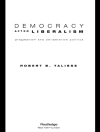At a time of grave ethical failure in global security affairs, this is the first book to bring together emerging theoretical debates on ethics and ethical reasoning within security studies.
In this volume, working from a diverse range of perspectives—poststructuralism, liberalism, feminism, just war, securitization, and critical theory—leading scholars in the field of security studies consider the potential for ethical visions of security, and lay the ground for a new field: ‚ethical security studies‘.
These ethical ‘visions’ of security engage directly with the meaning and value of security and security practice, and consider four key questions:
- • Who, or what, should be secured?
- • What are the fundamental grounds and commitments of different security ethics?
- • Who or what are the most legitimate agents, providers or speakers of security?
- • What do ethical security practices look like? What ethical principles, arguments, or procedures, will generate and guide ethical security practices?
Informed by a rich understanding of the intellectual and historical experience of security, the contributors advance innovative methodological, analytical, political and ethical arguments that represent the cutting edge of the field. This book opens a new phase of collaboration and growth that promises to have great benefits for the more humane, effective and ethical practice of security politics.
This book will be of much interest to students of critical security studies, ethics, philosophy, and international relations.












